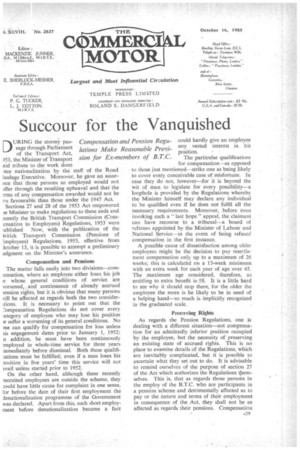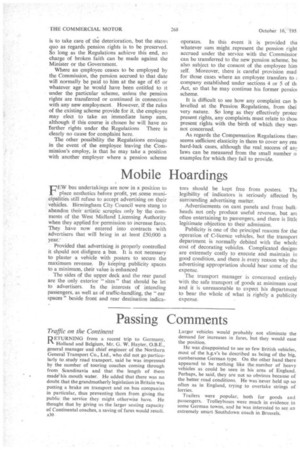Succour for the Vanquished
Page 31

Page 32

If you've noticed an error in this article please click here to report it so we can fix it.
DURING the storm'y passage through Parliament of the Transport Act, )53, the Minister of Transport aid tribute to the work done nce nationalization by the staff of the Road faulage Executive. Moreover, he gave an assurnce that those persons so employed would not iffer through the resulting upheaval and that the !rms of any compensation awarded would not be :ss favourable than those under the 1947 Act. Sections 27 and 28 of the 1953 Act empowered le Minister to make regulations to these ends and !cently the British Transport Commission (Cornensation to Employees) Regulations, 1953 were ublished. Now, with the publication of the Iritish Transport Commission (Pensions of 7,mployees) Regulations, 1953, effective from ktober 13, it is possible to attempt a preliminary udgment on the Minister's assurance.
Compensation and Pensions The matter falls easily into two divisions—comrensation, where an employee either loses his job ir whose general conditions of service are vorsened, and continuance of already accrued )ension rights, but it is obvious that many persons vill be affected as regards both the two consideraims. It is necessary to point out that the 7ompensation Regulations do not cover every :ategory of employee who may lose his position )r suffer a worsening of its general conditions. No me can qualify for compensation for loss unless us engagement dates prior to January 1, 1952; n addition, he must have been continuously :mployed in whole-time service for three years mmediately before dismissal. Both these qualifiatioris must be fulfilled; even if a man loses his position in five years' time this service will not wail unless started prior to 1952.
On the other hand, although these recently recruited employees are outside the scheme, they :ould have little cause for complaint in one sense, for before the date of their first employment the denationalization programme of the Government was declared. Apart from this, such short employment before denationalization became a fact could hardly give an employee any vested interest in his position.
The particular qualifications for compensation—as opposed to those just mentioned—strike one as being likely to cover every conceivable case of misfortune. In case they do not, however—for it is beyond the wit of man to legislate for every possibility—a loophole is provided by the Regulations whereby the Minister himself may declare any individual to be qualified even if he does not fulfil all the necessary requirements. Moreover, before even invoking such a "last hope" appeal, the claimant can have recourse to a tribunal—a board of referees appointed by the Minister of Labour and National Service—in the event of being refused compensation in the first instance.
A possible cause of dissatisfaction among older employees might be the decision to pay resettlement compensation only up to a maximum of 26 weeks; this is calculated on a 13-week minimum with an extra week for each year of age over 45. The _maximum age considered, therefore, as entitling to extra benefit is 58. It is a little hard to see why it should stop there, for the older the employee the more is he likely to be in need of a helping hand—so much is implicitly recognized in the graduated scale.
Preserving Rights As regards the Pension Regulations, one is dealing with a different situation—not compensation for an admittedly inferior position occupied by the employee, but the necessity of preserving an existing state of accrued rights. This is no place to examine details of the Regulations, which are inevitably complicated, but it is possible to ascertain what they set out to do. It is advisable to remind ourselves of the purpose of section 27 of the Act which authorizes the Regulations themselves. This is, that as regards those persons in the employ of the B.T.C. who are participants in a pension scheme and detrimentally affected as to pay or the nature and terms of their employment in consequence of the Act, they shall not be so affected as regards their pensions. Compensation is to take care of th.e deterioration, but the status quo as regards pension rights is to be preserved. So long as the Regulations achieve this end, no charge of broken faith can be made against the Minister or the Government.
Where an employee ceases to be employed by the Commission, the pension accrued to that date will normally be paid to him at the age of 65 or whatever age he would have been entitled to it under the particular scheme, unless the pension rights are transferred or continued in connection with any new employment. However, if the rules of the existing scheme provide for it, the employee may elect to take an immediate lump sum, although if this course is chosen he will have no further rights under the Regulations There is clearly no cause for complaint here.
The other possibility the Regulations envisage in the event of the employee leaving the Commission's employ, is that he may take a position with another employer where a pension scheme operates. In this event it is provided tha whatever sum might ,represent the pension right accrued under the service with the Commissior can be transferred to the new pension scheme, bu also subject to the consent of the employee him self. Moreover, there is careful provision mad for those cases where an employee transfers to. ; company established under sections 4 or 5 of th Act, so that he may continue his former pensioi scheme.
It is difficult to see how any complaint can b. levelled at the Pension Regulations, from thei very nature. So long as they effectively protec present rights, any complaints must relate to thost present rights with the birth of which they wen not concerned.
As regards the Compensation Regulations then seems sufficient elasticity in them to cover any rea hard-luck cases, although the real, success of an laws can be measured from the small number o examples for which they fail to provide.




























































































